七年级一般将来时知识点
一般现在时、一般过去时、一般将来时
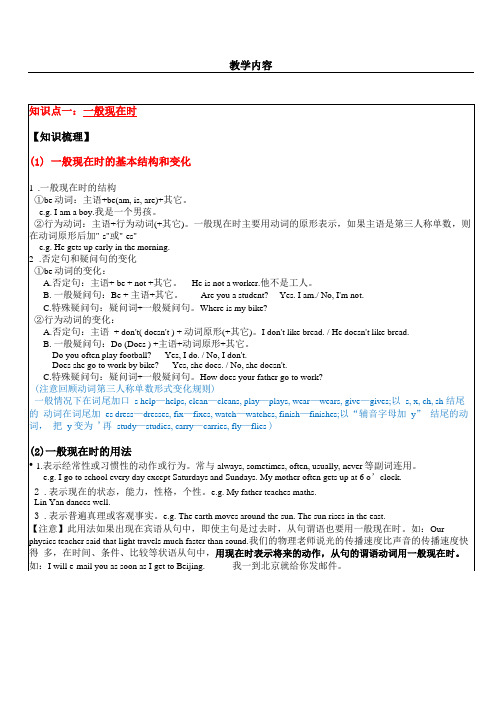
教学内容【例题精讲】例1.------ W ho is that lady?She's Miss Green. She us music, and she is so good.A. taughtB. teachesC. will teachD. is teaching 例 2. I think I'll take a bus to the meeting.A. do The bus? If you, you will be late.B. have doneC. will do例3. Unless the weather, we will have to cancel the picnic.A. improveB. improvesC. improvedD. will improve例4. We don't know if our friend .If he, we'll let you know.A. comes; comesB. comes; will come例5. Our geography teacher told us that the earth C. will come; comesthe sun.A. went aroundB. goes aroundC. is going aroundD. was going around【课堂练习】1.Look! A dog a blind man across the road.A. leadsB. leadC. is leadingD. led2.They usually TV in the evening.A. watchB. will watchC. are watchingD. watches3.He hardly up early.A. getsB. getC. doesn't getD. don't get4.John football.A. likes playingB. likes playC. like play5.Frank usually in touch with his primary school teachers by email.A. keepB. keepsC. keptD. will keep知识点二:一般过去时【知识梳理】(1)一般过去时的基本结构和变化1.定义:表示过去某时发生的动作或存在的状态。
一般将来时提问句型

一般将来时提问句型知识点讲解一、一般将来时的概念一般将来时表示将来某一时刻的动作或状态,或将来某一段时间内经常的动作或状态。
常常和表示将来的时间状语连用,如:tomorrow(明天),next week(下周),in the future (将来)等。
一般将来时由助动词shall(第一人称),will(第二、三人称)动词原形构成。
美国英语则不管什么人称,一律用will。
二、一般将来时的形式will / shall + 动词原形这种方法一般单纯地表示将来某个时间将要发生的动作或存在的状态。
will用于各种人称;shall只用于第一人称。
例如:I will / shall go to visit him next week. 下周我将去拜访他。
What time shall we meet next Saturday? 下星期六我们什么时候见面?be going to + 动词原形be going to 相当于一个助动词(其中be有人称和数的变化),与它后面的动词原形共同构成谓语,表示将来某个时间要发生的动作或存在的状态。
例如:He is going to play football this afternoon. 今天下午他要去踢足球。
They are going to have a meeting tomorrow. 他们明天要开会。
三、一般将来时的用法1表示将来的动作或状态一般将来时常与一些表示将来的时间状语连用,如:tomorrow(明天),next week(下周),from now on(从现在开始);in the future(将来)等。
例如:I will do a better job next time. 下次我要做得更好。
Oil and water will not mix. 油和水没法混在一起。
“be going to+动词原形”表示即将发生的或最近打算进行的事。
例如:①It is going to rain. 要下雨了。
一般将来时语法知识点
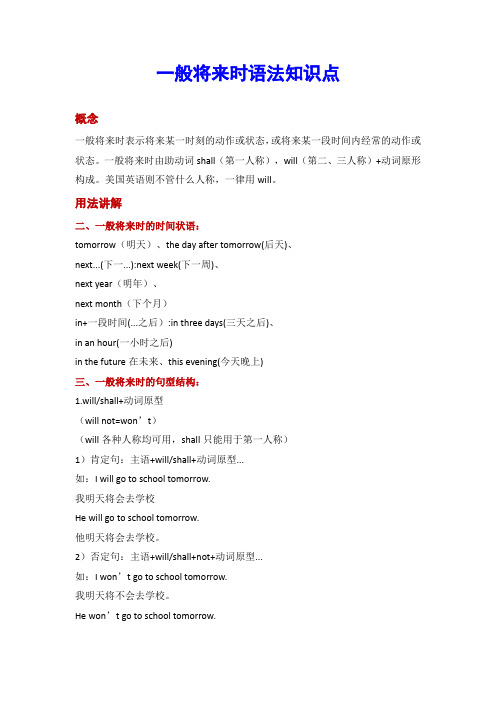
一般将来时语法知识点概念一般将来时表示将来某一时刻的动作或状态,或将来某一段时间内经常的动作或状态。
一般将来时由助动词shall(第一人称),will(第二、三人称)+动词原形构成。
美国英语则不管什么人称,一律用will。
用法讲解二、一般将来时的时间状语:tomorrow(明天)、the day after tomorrow(后天)、next...(下一...):next week(下一周)、next year(明年)、next month(下个月)in+一段时间(...之后):in three days(三天之后)、in an hour(一小时之后)in the future在未来、this evening(今天晚上)三、一般将来时的句型结构:1.will/shall+动词原型(will not=won’t)(will各种人称均可用,shall只能用于第一人称)1)肯定句:主语+will/shall+动词原型...如:I will go to school tomorrow.我明天将会去学校He will go to school tomorrow.他明天将会去学校。
2)否定句:主语+will/shall+not+动词原型...如:I won’t go to school tomorrow.我明天将不会去学校。
He won’t go to school tomorrow.他明天将不会去学校。
3)一般疑问句:Will/Shall+主语+动词原型...如:Will you go to school tomorrow?你明天要去学校吗?Will he go to school tomorrow?他明天要去学校吗?肯定回答:Yes,主语+will.如:Yes,I will.Yes,he will.否定回答:No,主语+will+not.如:No,I won’t.No,he won’t.4)特殊疑问句:特殊疑问词+will/shall+主语+动词原型... 如:What will you do tomorrow?你明天将会做什么?What will he do tomorrow?他明天将会做什么?2.be going to+动词原型1)肯定句:主语+be going to+动词原型...如:I am going to buy some books tomorrow.我明天打算去买一些书。
一般将来时知识点

一般将来时知识点一般将来时是英语中用来表达将来时间的一种时态。
在本文中,我们将介绍一般将来时的基本用法和相关的注意事项。
1. 用法一般将来时表示将来某个时间会发生的动作或存在的状态。
通常使用以下方式构成一般将来时:- 使用助动词 "will" + 动词原形,例如:I will go to the cinema tomorrow.- 使用 "be going to" + 动词原形,例如:She is going to take a vacation next month.2. 表示计划和打算一般将来时经常用于表达计划和打算。
当我们准备做一些与未来有关的事情时,可以使用一般将来时来表达我们的意图。
例如:- I will visit my grandparents this weekend.- She is going to study abroad next year.3. 表示预测和预见一般将来时还可以用于表示对未来事件的预测和推测。
我们可以根据目前的情况和证据来作出合理的预测。
例如:- It will rain tomorrow. (天气预报)- I think she will become a successful writer in the future. (个人观点)4. 表示意愿和承诺一般将来时还可以用来表示意愿和承诺。
当我们想要表达我们的意愿或者向别人做出承诺时,可以使用一般将来时来表达。
例如:- I will help you with your homework.- They are going to donate money to charity.5. 注意事项在使用一般将来时时,我们需要注意以下几点:- 在第一人称和第二人称中,"will" 和 "be going to" 是可以互换使用的。
例如:I will / am going to buy a new car.- 在第三人称中,"will" 和 "be going to" 有细微的区别。
初中英语知识点归纳一般将来时的构成与用法
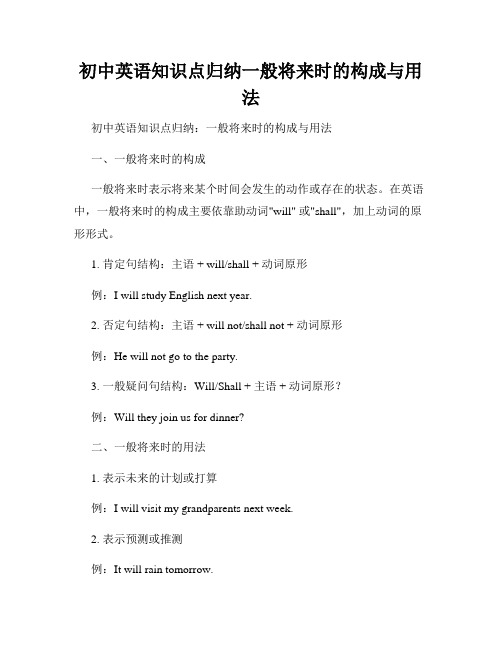
初中英语知识点归纳一般将来时的构成与用法初中英语知识点归纳:一般将来时的构成与用法一、一般将来时的构成一般将来时表示将来某个时间会发生的动作或存在的状态。
在英语中,一般将来时的构成主要依靠助动词"will" 或"shall",加上动词的原形形式。
1. 肯定句结构:主语 + will/shall + 动词原形例:I will study English next year.2. 否定句结构:主语 + will not/shall not + 动词原形例:He will not go to the party.3. 一般疑问句结构:Will/Shall + 主语 + 动词原形?例:Will they join us for dinner?二、一般将来时的用法1. 表示未来的计划或打算例:I will visit my grandparents next week.2. 表示预测或推测例:It will rain tomorrow.3. 表示意愿、请求、承诺等例:I will help you with your homework.4. 在条件句中表示未来可能发生的情况例:If it snows tomorrow, we will go skiing.5. 表示将来常态、客观事实例:The sun will rise in the east.三、注意事项1. "will" 和"shall" 可互换使用,但通常在口语中我们更倾向于使用"will"。
2. 若主语为第三人称单数,直接在助动词后加"not"构成否定句。
例:She will not come to the meeting.3. 在口语中,一般将来时也可以使用 "be going to"表示将来的动作或状态。
一般将来时知识点整理

一般将来时知识点整理
嘿,宝子们!今天咱来聊聊一般将来时那些事儿。
一般将来时呀,就是表示将来要发生的动作或存在的状态哦!就好比你说明天我要去逛街,这就是一般将来时啦。
例子:I will go shopping tomorrow.(我明天会去购物。
)
一般将来时有好几种表现形式呢。
首先,常见的就是“will+动词原形”啦,这就像一个坚定的承诺,比如 He will come to see you.(他会来看你的。
)再者呢,还有“be going to+动词原形”,这就好像是有计划、有
打算的未来行动,就像 She is going to study abroad.(她打算出国留学。
)哎呀,这不就像是你满心期待着要做一件很棒的事情嘛!
想象一下,你和朋友约好了下个月一起去旅行,你肯定会说 We are going to travel next month. (我们下个月要去旅行。
)而不是说其他时
态呀,对吧?一般将来时多重要呀!
还有哦,一般将来时还可以和一些表示将来的时间状语搭配使用呢,比如 tomorrow(明天)、next week(下周)、in the future(未来)等等。
你想想看,要是没有这些时间状语来明确时间,那岂不是有点迷糊啦?
宝子们,一般将来时真的超级有用的,一定要好好掌握呀,以后说英语可就靠它啦!别小瞧它哟,学会了它就能更好地表达对未来的憧憬啦!哈哈!。
初中英语一般将来时结构形式的时态知识点
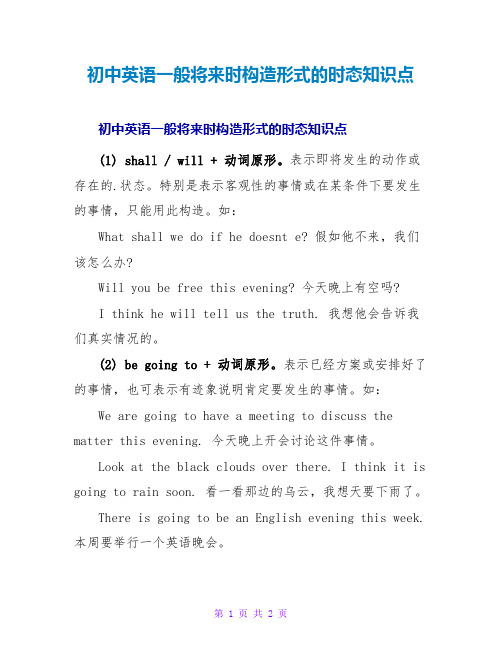
初中英语一般将来时构造形式的时态知识点初中英语一般将来时构造形式的时态知识点(1) shall / will + 动词原形。
表示即将发生的动作或存在的.状态。
特别是表示客观性的事情或在某条件下要发生的事情,只能用此构造。
如:What shall we do if he doesnt e? 假如他不来,我们该怎么办?Will you be free this evening? 今天晚上有空吗?I think he will tell us the truth. 我想他会告诉我们真实情况的。
(2) be going to + 动词原形。
表示已经方案或安排好了的事情,也可表示有迹象说明肯定要发生的事情。
如:We are going to have a meeting to discuss the matter this evening. 今天晚上开会讨论这件事情。
Look at the black clouds over there. I think it is going to rain soon. 看一看那边的乌云,我想天要下雨了。
There is going to be an English evening this week. 本周要举行一个英语晚会。
(3) be to + 动词原形。
表示一种常规性的活动或注定要做的事情。
如:Who is to clean the classroom today? 今天该谁清扫教室了?When are you to return your library book? 你什么时候要还图书?(4) be about to + 动词原形。
表示就要做或正好要做的事情。
往往暗含一种时间上的巧合,因此,句子不能再用时间状语。
如:。
(完整版)一般将来时初中语法
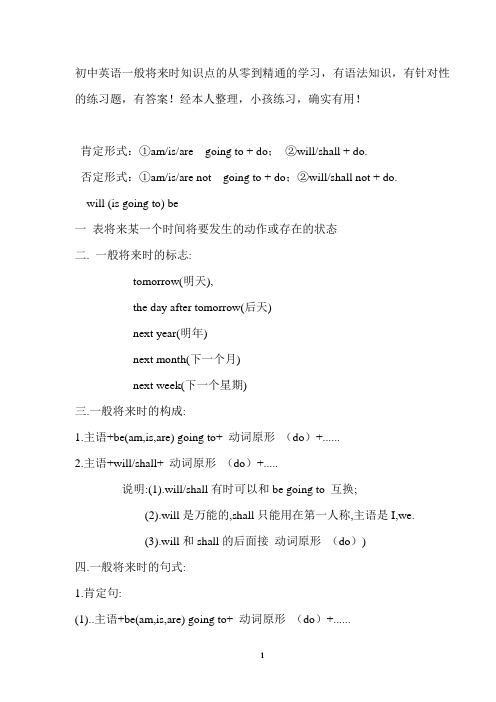
初中英语一般将来时知识点的从零到精通的学习,有语法知识,有针对性的练习题,有答案!经本人整理,小孩练习,确实有用!肯定形式:①am/is/are going to + do;②will/shall + do.否定形式:①am/is/are not going to + do;②will/shall not + do.will (is going to) be一表将来某一个时间将要发生的动作或存在的状态二. 一般将来时的标志:tomorrow(明天),the day after tomorrow(后天)next year(明年)next month(下一个月)next week(下一个星期)三.一般将来时的构成:1.主语+be(am,is,are) going to+ 动词原形(do)+......2.主语+will/shall+ 动词原形(do)+.....说明:(1).will/shall有时可以和be going to 互换;(2).will是万能的,shall只能用在第一人称,主语是I,we.(3).will和shall的后面接动词原形(do))四.一般将来时的句式:1.肯定句:(1)..主语+be(am,is,are) going to+ 动词原形(do)+......(2)..主语+will/shall+ 动词原形(do)+.....2.否定句:(1)..主语+be(am,is,are) not going to+ 动词原形(do)+......(2)..主语+will/shall not+ 动词原形(do)+.....3.一般疑问句:(1).Am/Is,Are+主语+going to+ 动词原形(do)+....(2).Will//shall+主语+ 动词原形(do)+...4.特殊疑问句:(1).What (Where, How...)+be (am,is,are)+主语+ going to + 动词原形(do)+...?(2). What (When,Where,How...) +will/shall+ 主语+ 动词原形(do)+...?二、基本结构:①be going to + do;②will+ do.三、否定句:在be动词(am, is, are)后加not或will后加not成won’t。
- 1、下载文档前请自行甄别文档内容的完整性,平台不提供额外的编辑、内容补充、找答案等附加服务。
- 2、"仅部分预览"的文档,不可在线预览部分如存在完整性等问题,可反馈申请退款(可完整预览的文档不适用该条件!)。
- 3、如文档侵犯您的权益,请联系客服反馈,我们会尽快为您处理(人工客服工作时间:9:00-18:30)。
七年级一般将来时知识点
一、概念
一般将来时表示将要发生的动作或存在的状态,通常由“will/shall + 动词原形”构成。
例如:
We will go to the cinema tomorrow. (我们明天会去看电影。
)
She shall visit her grandparents next week. (下个星期她会去探望她的祖父母。
)
二、使用
1. 表示将来的计划或意愿。
例如:
I will study hard this year. (我今年会努力学习。
)
He will go to the party tonight. (他今晚会去参加派对。
)
2. 表示预测或推测未来的情况。
例如:
It will rain tomorrow. (明天会下雨。
)
She will be famous one day. (她总有一天会成为名人。
)
3. 表示一种习惯性的行为或状态。
例如:
She will often visit her aunt on weekends. (她通常会在周末去看望她的姑姑。
)
He will be late for class again. (他又要迟到上课了。
)
4. 表示答应或允诺。
例如:
I will help you with your homework. (我会帮你做作业的。
)
She will never forget your kindness. (她永远都不会忘记你的好心情。
)
三、特殊情况
1. 对于第一人称单数,可以使用“shall”代替“will”表达意愿或承诺。
例如:
Shall I carry the bag for you? (我要不要帮你拿包?)
I shall never forget your help. (我永远不会忘记你的帮助。
)
2. 在某些情况下,可以使用“be going to + 动词原形”代替一般将来时。
例如:
I am going to visit my grandparents this weekend. (这个周末我要去看望我的祖父母。
)
She is going to become a singer. (她将要成为一名歌手。
)
四、注意事项
一般将来时不能与时间状语“yesterday, last week, last year, ago”等连用。
因为这些时间是过去的,与未来无关。
例如:
He will go to New York yesterday. (错误)
He went to New York yesterday. (正确)
总之,掌握一般将来时是英语学习的基本功之一。
只有在字母表、基础词汇的基础上,再加上语言知识的积累和动手能力的训练,才能真正轻松地学好这一知识点。
